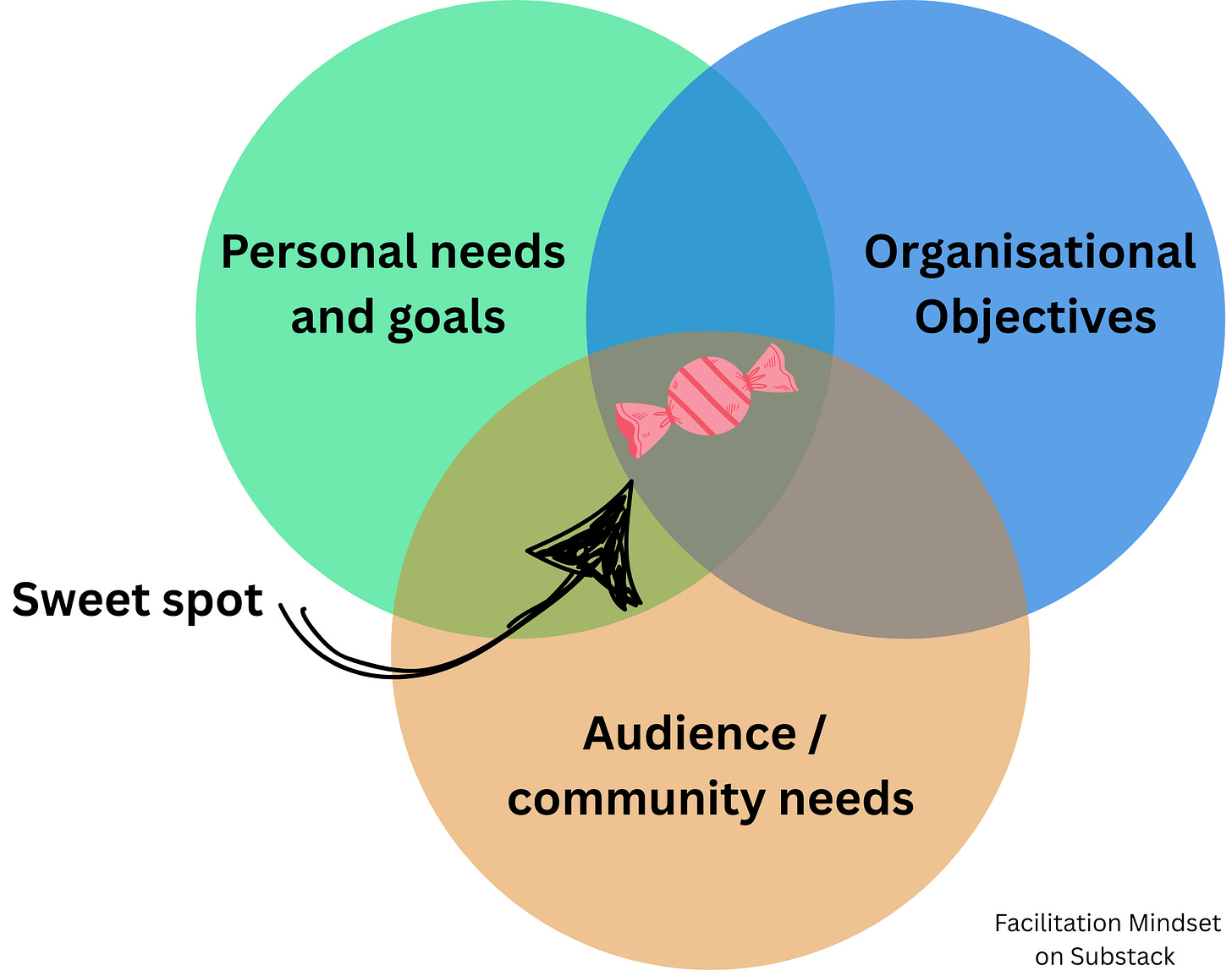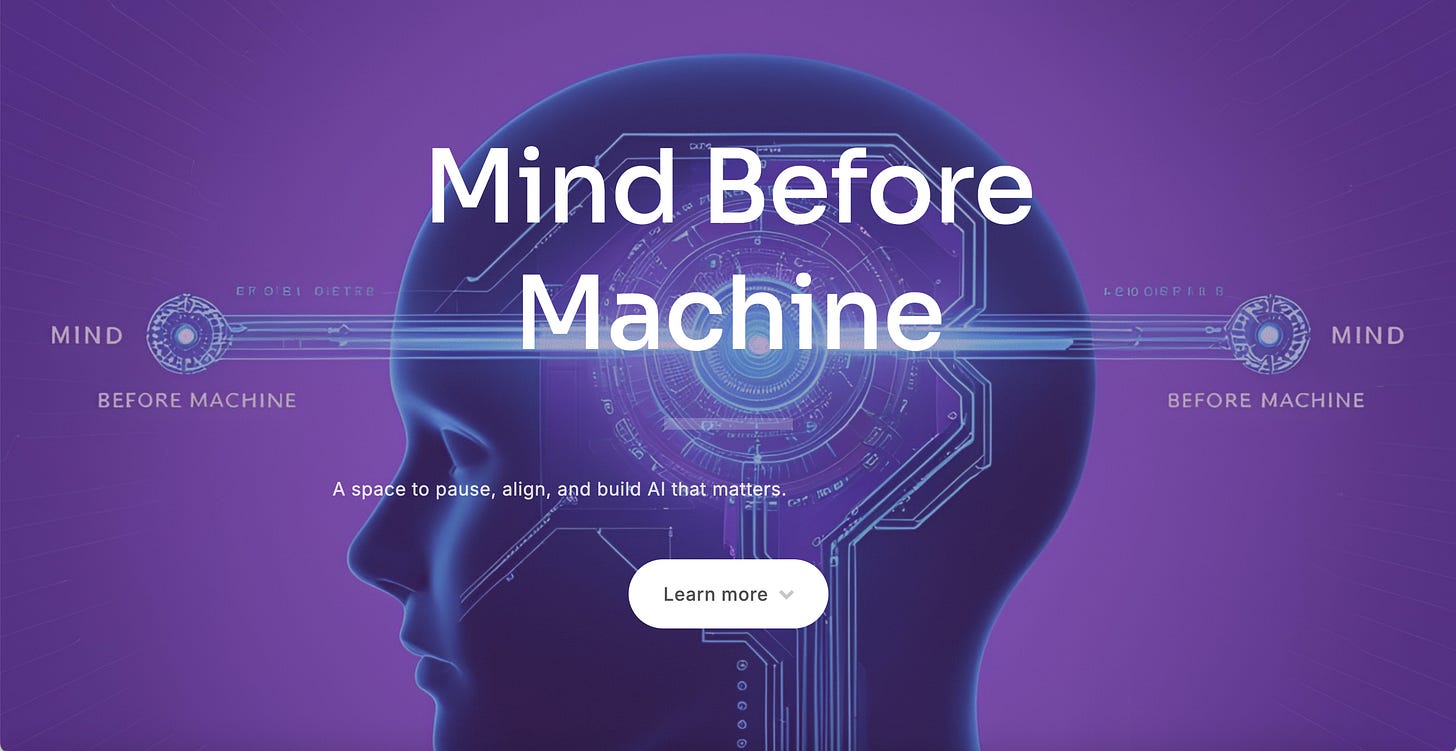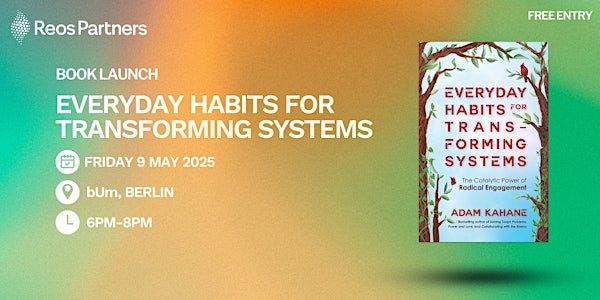C is for... Constructive Selfishness
Plus: What differentiates a consultancy mindset from a facilitation mindset?
This year, I’m taking on a creative challenge: to produce an A to Z of facilitation mindset shifts— a series of quick, practical posts on key mindset shifts that make collaboration more effective.
I will be linking the whole alphabet as it is produced on this page. It’s a great one to bookmark 😉
Let’s dive into with C… Constructive Selfishness
One of the facilitators I learned most from early in my career, Allen Gunn (“Gunner”) of Aspiration Tech, regularly used the following line to set the tone of his events:
“I invite you to approach this event with a spirit of constructive selfishness”
I always liked the phrase and it stuck with me. As time has passed and I have experienced many events, gatherings and workshops which are not planned to allow for this mindset, I’ve realised how crucial it is to the success of many of them.
You’ve probably been to those gatherings too:
Where people show up out of obligation, not curiosity
Where the outcomes serve the organisation (or an individual leader), but not the people in the room
The wedding that doesn’t take into account the guest’s needs
Key word: constructive
Let’s be clear, constructive is doing a lot of work here. When selfishness turns into entitlement, and participants ignore group goals or dominate conversations, it undermines everything.
But when people are encouraged to identify and pursue their own goals while keeping the group’s purpose in mind, something powerful happens… and there is something about this little phrase that seems to kindle initiative and creative problem solving.
Participants typically take greater ownership of their experience. People pull the information they need, rather than passively receiving what is pushed at them. They ask the questions that they need to know, that others are not bold enough to. There’s a hunger that, if satisfied, can carry impact far beyond the session itself.
The kinds of things people come up with when invited to be selfish can vary widely. Some responses are driven by personal ambition, but in my experience, most people are trying to address something less tangible or more emotional. Often, it's the sort of thing that answers the question, “What keeps you up at night?”
And the things that keep people up at night are often not concerns unique to one person alone. More often than not, they reflect shared worries or unresolved tensions that many others quietly carry too, or things that concern the whole organisation/group or the people served by it.
Constructive selfishness and the big picture
Personal needs and goals is obviously only one of the dimensions we need to pay attention to when we are designing workshops. There are usually some organisational or team goals as well as the needs of whoever is ultimately being served for example a customer, audience or community.
I like to keep this little Venn diagram front of mind when planning a workshop, as a way to check whether I’m landing in the sweet spot. Sometimes I also show it to participants.
Although I have plotted this as a tidy Venn Diagram, it’s rarely a perfect balance between the three areas, and there will usually be a clear emphasis in one of them, but the key is to acknowledge all three categories of need and to plan for them intentionally.
The Mindset Shift:
Constructive selfishness is acknowledging that when people assert their own needs and agendas respectfully and intentionally, it increases the likelihood that the ideas born from the event will have longer lasting impact.
From: Asking participants to give selflessly to someone else’s agenda
To: Recognising that a little bit of well-placed constructive selfishness brings the energy to really help participants become the crew, not the passenger of your event.
I’m curious - does the term constructive selfishness resonate with you? Do you use anything similar? Let me know on lucy@facilitationmindset.com.
One more cool thing beginning with C!
I launched a little Youtube series: Exploring the Edges of Facilitation as a sister initiative to this Substack.
The purpose of the series? I believe that as facilitators, the more we understand the edges and grey areas of our craft, the better we become at serving groups. Because spoiler: facilitation isn’t always the answer. Sometimes stepping into another role might better support the group (and other times, setting a boundary is what is required).
We kick off the series with the wonderful Lára Kristín Skúladóttir, a facilitator, leadership coach and management consultant from Iceland.
Here’s Episode 1, where we explore the mindset, toolset and skillset differences between facilitation and consulting.
And Episode 2, where we dive in a bit deeper unpacking facilitative consulting and facilitation-first consulting. We also explore the role of neutrality, how facilitation builds leadership skills and which of facilitation or consulting is our go-to for change management.
This will be the first of hopefully many videos (as there are many things facilitation gets confused with or has many similarities to!). Coming soon is Facilitation vs Moderation and Facilitation vs Training. Watch the series on YouTube.
Where to find me in the next two weeks
Online
I’m going back to my product roots and teaming up with one of my favourite product thinkers, Laura Dietze of Product and Change, for a series of 60 minute working labs starting May 13th exploring the family of product problems which are falling off the AI bandwagon.
If you work in product and any of these sound familiar, this could be for you!
Everyone’s buzzing about AI — but when it comes time to actually build, things fall apart...
🤔 No one agrees on what "AI" even means.
🤔 You’re chasing shiny tools without a clear problem.
🤔 Stakeholders want “something with AI,” yesterday.
🤔 The team is building fast — but not necessarily right.
And these are the labs:
What Do You Mean by AI? (27 May 2025 - 6pm CEST)
Bust jargon, cut through hype, and get specific.What Do You Want to Outsource to AI? (17 June 2025 - 6pm CEST)
Use a simple but powerful decision framework to find clarity on what stays human vs. what’s ripe for automation.Sure Things and Wild Swings (1 July 2025 - 6pm CEST)
Apply product strategy tools to explore safe bets, bold moves, and how to align them with your org’s appetite for risk.From Hype to How: Align AI to Real Goals (15 July 2025 - 6pm CEST)
Use the Lean Value Tree to map your AI efforts to clear outcomes and value — no more “just build it and hope.”
Or get more details on the website.
In Berlin
When I drafted this mail - I was planning to attend this event, but sadly I can no longer make it. Still including it in case it is useful to others though!
Friday 9th May the Berlin Book Launch of Adam Kahane’s new book, Everyday Habits for Transforming Systems is taking place. I’ve recommended a book by Adam before (Facilitating Breakthrough) in the Facilitation Mindset Book Recommendations, so I am looking forward to this one.
About the book:
"For all of you who want to contribute to creating a world with more connection, agency, and justice, and less fragmentation, oppression, and inequity. This is for you. This is for us."




